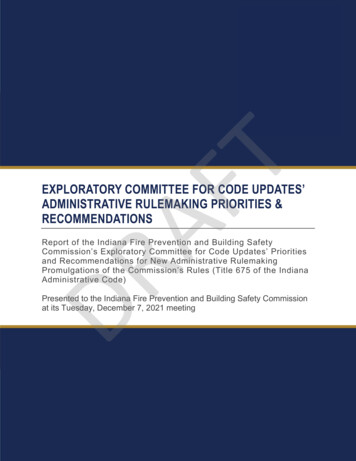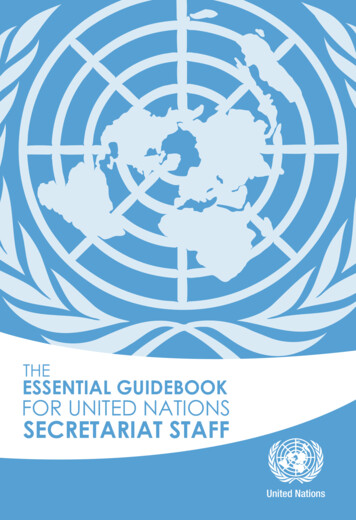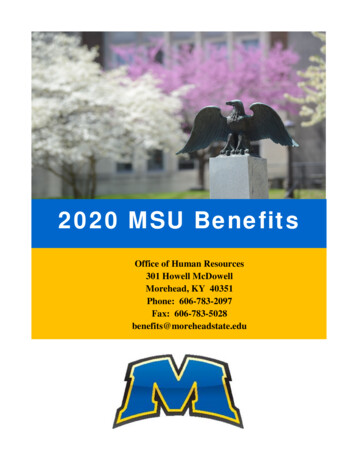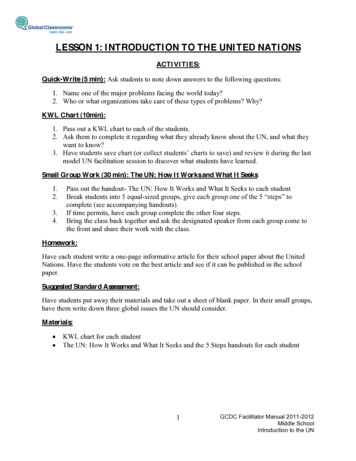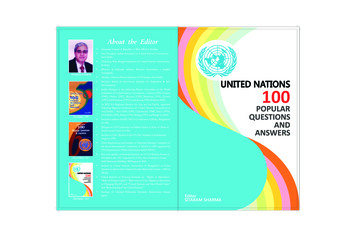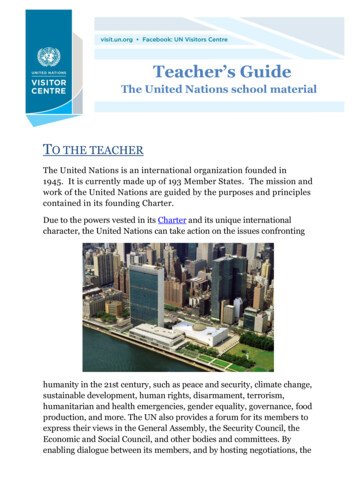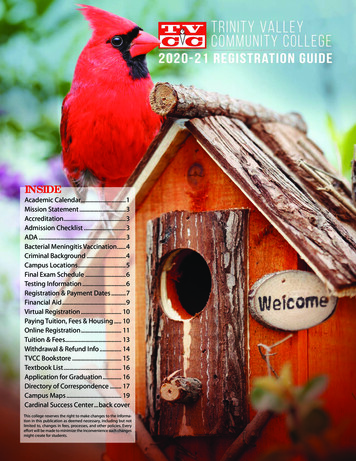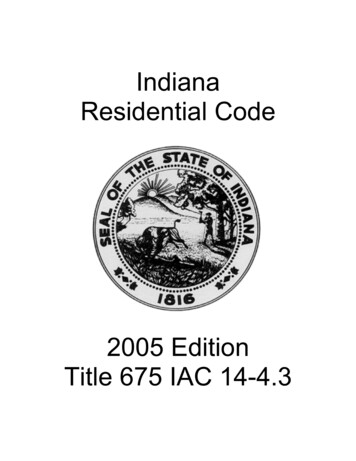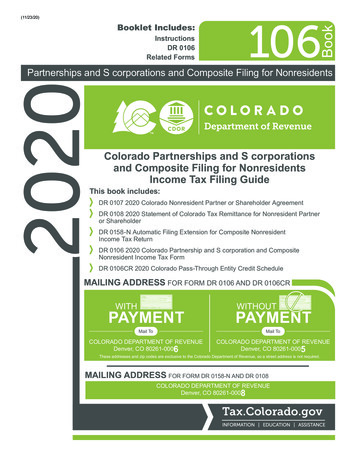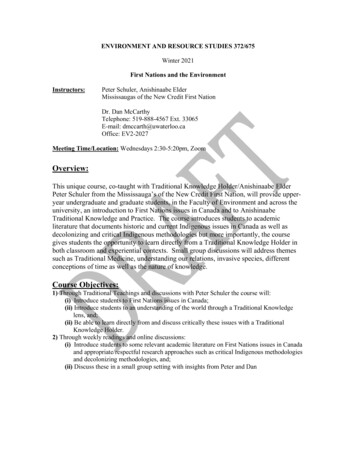
Transcription
ENVIRONMENT AND RESOURCE STUDIES 372/675Winter 2021First Nations and the EnvironmentInstructors:Peter Schuler, Anishinaabe ElderMississaugas of the New Credit First NationDr. Dan McCarthyTelephone: 519-888-4567 Ext. 33065E-mail: dmccarth@uwaterloo.caOffice: EV2-2027Meeting Time/Location: Wednesdays 2:30-5:20pm, ZoomOverview:This unique course, co-taught with Traditional Knowledge Holder/Anishinaabe ElderPeter Schuler from the Mississauga’s of the New Credit First Nation, will provide upperyear undergraduate and graduate students, in the Faculty of Environment and across theuniversity, an introduction to First Nations issues in Canada and to AnishinaabeTraditional Knowledge and Practice. The course introduces students to academicliterature that documents historic and current Indigenous issues in Canada as well asdecolonizing and critical Indigenous methodologies but more importantly, the coursegives students the opportunity to learn directly from a Traditional Knowledge Holder inboth classroom and experiential contexts. Small group discussions will address themessuch as Traditional Medicine, understanding our relations, invasive species, differentconceptions of time as well as the nature of knowledge.Course Objectives:1) Through Traditional Teachings and discussions with Peter Schuler the course will:(i) Introduce students to First Nations issues in Canada;(ii) Introduce students to an understanding of the world through a Traditional Knowledgelens, and;(ii) Be able to learn directly from and discuss critically these issues with a TraditionalKnowledge Holder.2) Through weekly readings and online discussions:(i) Introduce students to some relevant academic literature on First Nations issues in Canadaand appropriate/respectful research approaches such as critical Indigenous methodologiesand decolonizing methodologies, and;(ii) Discuss these in a small group setting with insights from Peter and Dan
Course Structure:Lecture/seminar discussions: Each class will be loosely broken down into twocomponents (all Zoom sessions will be recorded and uploaded to LEARN):1. Traditional teaching and discussion led by Peter Schuler2. Discussion of readings and cross cutting themes led by DanMcCarthyResources:Course Texts:Kimmerer, Robin. 2013. Braiding Sweetgrass: Indigenous Wisdom, ScientificKnowledge and the Teachings of Plants. Milkweed Editions.Yunkaporta, Tyson. 2020. Sand Talk: How Indigenous Thinking Can Save theWorld. Harper One.LEARN:All course communications and course materials (lecture notes, weekly readings, weeklysession recordings) will be provided through LEARN. Please sign in to LEARN as soonas possible and ensure you are on the course roster and that your e-mail address iscorrect.Course schedule and weekly readings will be provided through LEARN under“Lessons”.Supplemental course readings are posted under “Readings”, under weekly “Lessons”,as links or specific references are provided and students are expected to find these usingthe University of Waterloo’s E-Journals Collection available ease allow at least 24 hours for responses to e-mail inquiries from the teaching teamand do not expect e-mail responses from the teaching team over the weekend.Course Requirements:Assignment #1: Weekly Reflections - 20% Each week students will be required to do a critical reflection on their learning (basedon in-class discussions and readings) throughout the course. A synthesis of thispersonal critical reflection (no more than 1-page) will be submitted to the instructors. Due Date: Every Friday before the class on Wednesday (LEARN Dropbox)Assignment #2: “Puhpowee” (Learning Artifact) - 10% Students will create an “artifact” that represents their learning throughout the course.Peter will explain the significance of this artifact during class and it will provide partof the basis for the student presentation and final reflective paper. Due Date: Ready for student presentationsAssignment #3: Presentations - 20% Students will provide a 15-minute presentation and foster discussion in the last threeweeks of class. The presentations will synthesize their learning throughout the
course based on Peter’s teachings, the course readings and will integrate a discussionof their learning artifact.Due Date: Weeks 10-12 – March 24th, 31st and April 7thAssignment #4: Final Reflective Paper / Small Group Final Paper - 50% OPTION #1 - This final reflective paper will be an opportunity for students tosynthesize their learning throughout the term based on an integration of Peter’steachings, weekly readings and discussions, weekly critical reflections and on theirlearning artifact. An abstract of the final paper (10% of Assignment #4) should besubmitted to the instructors via email before the reading break (Friday February19th before midnight, LEARN Dropbox). OPTION #2 – In small groups (up to 4), and in collaboration with Peter and Dan,this will be an opportunity to explore a social ecological issue/ problem context thathas implications for the Indigenous Peoples of Turtle Island (North America).Examples include: Environmental implications of the Indian Act, Grassy Narrows,Mackenzie Valley, Oil Sands, Standing Rock, decline of fish stocks on east coast.An abstract of the final paper (10% of Assignment #4) should be submitted to theinstructors via email before the reading break (Friday February 19th beforemidnight). Due Date: April 9th, 2021 by midnight (LEARN Dropbox).Course Schedule and Readings:NOTE: Please refer to LEARN site regularly for changes to this tentative Schedule and forWeekly ReadingsWeek #1 – January 13th – Introduction to the courseWeek #2 – January 20th – What is Medicine?Readings: Braiding Sweetgrass, Planting Sweetgrass Sand Talk, The Porcupine, the Paleo-mind and the Grand Design, The AlbinoBoy and Lemonade for Headaches Godlewska, A., Moore, J., & Bednasek, C. D. (2010). Cultivating ignorance ofAboriginal realities. The Canadian Geographer/Le Géographe Canadien, 54(4):417-440.Optional: Porter, L. (2004). Unlearning one's privilege: Reflections on cross-culturalresearch with Indigenous Peoples in south-east Australia. Planning Theory &Practice, 5(1): 104-109.Week #3 – January 27th – What is the Sweat Lodge?Readings: Braiding Sweetgrass, Tending Sweetgrass Sand Talk, First Law and Forever Limited Regan, P. (2005). A transformative framework for decolonizing Canada: A non-
Indigenous approach. Paper presented at the University of Victoria, IGOVDoctoral Student Symposium. Victoria, British Columbia, Canada.Week #4 – February 3rd – What are our relatives doing? Understanding your relatives.Readings: Braiding Sweetgrass, Picking Sweetgrass Sand Talk, Lines in the Sand and Of Spirit and Spirit Cronon. W. (1995). The Trouble with Wilderness; or, Getting Back to the WrongNature. Pages 69-90 in Cronon, W. (editor) (1995). Uncommon Ground:Rethinking the Human Place in Nature. W. W. Norton & Co.: New York, NewYork, USA.Week #5 – February 10th – Invasive SpeciesReadings: Braiding Sweetgrass, Braiding Sweetgrass 1 Sand Talk, Romancing the Stone and Displaced Apostrophes Johnson, J. T., & Murton, B. (2007). Re/placing native science: Indigenous voicesin contemporary constructions of nature. Geographical Research, 45(2), 121-129.READING WEEK February 17thWeek #6 – February 24th – Different Notions of Time – “Indian Time”Readings: Braiding Sweetgrass, Braiding Sweetgrass 2Week #7 – March 3rd – Women’s TeachingsReadings: Sand Talk, Duck Hunting is Everybody’s Business Other Readings TBDWeek #8 – March 10th – On the Nature of Knowledge – Traditional KnowledgeReadings: Braiding Sweetgrass, Burning Sweetgrass 1 Little Bear, L. (2000). Jagged worldviews colliding. Pages 77-85 in M. Battiste(Ed.), Reclaiming indigenous voice and vision. UBC Press: Toronto, Ontario,Canada.Week #9 – March 17th – 8th Fire Prophesy and Synthesis DiscussionReadings: Braiding Sweetgrass, Burning Sweetgrass 2 Epilogue Sand Talk, Immovable Meets Irresistible, Be Like Your Place, Which Way Corntassel, J. (2012). Re-envisioning resurgence: Indigenous pathways todecolonization and sustainable self-determination. Decolonization: Indigeneity,Education & Society, 1(1): 86-101.Week #10 – March 24th – Student Presentations
Readings:Student-recommended readingsWeek #11 – March 31st – Student PresentationsReadings:Student-recommended readingsWeek #12 – April 7th – Student PresentationsReadings:Student-recommended readingsAcademic Integrity:Academic Integrity: In order to maintain a culture of academic integrity, members of theUniversity of Waterloo community are expected to promote honesty, trust, fairness, respect andresponsibility. www.uwaterloo.ca/academicintegrity/. Students who are unsure what constitutesan academic offence are requested to visit the on-line tutorial at: http://www.lib.uwaterloo.ca/ait/Research Ethics: Please also note that the University of Waterloo requires all research conductedby its students, staff, and faculty which involves humans as participants to undergo prior ethicsreview and clearance through the Director, Office of Human Research and Animal Care (Office).The ethics review and clearance processes are intended to ensure that projects comply with theOffice’s Guidelines for Research with Human Participants (Guidelines) as well as those ofprovincial and federal agencies, and that the safety, rights and welfare of participants areadequately protected. The Guidelines inform researchers about ethical issues and procedureswhich are of concern when conducting research with humans (e.g. confidentiality, risks andbenefits, informed consent process, etc.).If the development of your research proposal consists of research that involves humans asparticipants, the please contact the course instructor for guidance and see:www.research.uwaterloo.ca/ethics/human/Note for students with disabilities: The Office for Persons with Disabilities (OPD), located inNeedles Hall, Room 1132, collaborates with all academic departments to arrange appropriateaccommodations for students with disabilities without compromising the academic integrity ofthe curriculum. If you require academic accommodations to lessen the impact of your disability,please register with the OPD at the beginning of each academic term.Religious Observances: Please inform the instructor at the beginning of term if specialaccommodation needs to be made for religious observances that are not otherwise accounted forin the scheduling of classes and assignments.Grievance: A student who believes that a decision affecting some aspect of his/her universitylife has been unfair or unreasonable may have grounds for initiating a grievance. Read Policy 70 Student Petitions and Grievances, Section tm. When in doubt, please contact yourUndergraduate Advisor for details.
Discipline: A student is expected to know what constitutes academic integrity, to avoidcommitting academic offence, and to take responsibility for his/her actions. A student who isunsure whether an action constitutes an offense, or who needs help in learning how to avoidoffenses (e.g., plagiarism, cheating) or about “rules” for group work/collaboration should seekguidance from the course professor, academic advisor, or the Undergraduate Associate Dean. Forinformation on categories of offences and types of penalties, students should refer to Policy 71,Student Discipline, . For typical penalties,check Guidelines for Assessment of penaltyguidelines.htmAppeals: A decision made or penalty imposed under Policy 70 - Student Petitions andGrievances (other than a petition) or Policy 71 – (Student Discipline) may be appealed if there isa ground. A student who believes he/she has a ground for an appeal should refer to Policy 72(Student Appeals). See: Consequences of Academic Offences:ENV students are strongly encouraged to review the material provided by the university’sAcademic Integrity office (see: ex.html).Turnitin:Plagiarism detection software (Turnitin) will be used to screen assignments on this course. This isbeing done to verify use of all material and sources in assignments is documented. In the firstlecture of the Term, details will be provided about the arrangements for the use of Turnitin.NOTE: Students may request an alternative to Turnitin, which is to prepare an annotatedbibliography for each assignment. For advice on how to prepare an annotated bibliography, ibliography
Braiding Sweetgrass, Braiding Sweetgrass 2 Week #7 - March 3rd - Women's Teachings Readings: Sand Talk, Duck Hunting is Everybody's Business Other Readings TBD Week #8 - March 10th - On the Nature of Knowledge - Traditional Knowledge Readings: Braiding Sweetgrass, Burning Sweetgrass 1 Little Bear, L. (2000).
